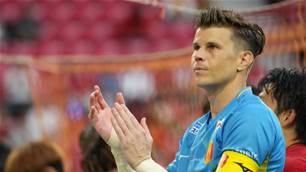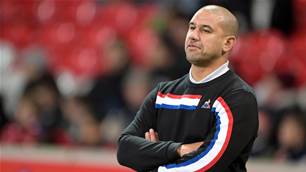What should the next A-League club look like? Wollongong Wolves reckon its bark should be as bad as its bite.
It’s June 11 in the first year of the new millennium. Y2K has come to pass, the GST is about to be introduced and the ‘Wolves’ are trying to live up to their intimidating new moniker in the 2000 NSL Grand Final.
The club hadn’t won anything since 1988 and in the sort of bizarre format choices reserved for Australian football, had actually lost to their finals opponent, Perth Glory, in the semi-finals. But here they were, in front of a 41,000 capacity crowd at Subiaco Oval, and they were getting thrashed.
Perth had scored three times in 20 minutes to send the Wolves into half-time, tail-between-their-legs, copping what must of sounded like mad advice from coach Nick Theodorakopoulos - "Let's score a goal in each of the next 15 minutes, get it to 3-2, and see how they react.”
The rest, as Wolves' CEO Chris Papakosmas says, is history.
“We played the most memorable Grand Final in Australian history,” he recounted.
“Coming back from 3-0 down at half-time to win against Perth, in Perth, in a penalty shootout. I had an email from a Perth supporter a while ago, which began with ‘I absolutely detest the Wolves, I’ll hate you until I die.’
“He went on like that for awhile and then finished with ‘I’ll be at the front of the line, supporting you as strongly as I can for your re-inclusion into the national competition – not because I like you, don’t get me wrong, I hate you – but because I want to be at WIN Stadium when we play you to watch our boys smack you 3-0 and fly home with a smile on my face.’
“You can’t buy that passion. You can’t manufacture that level of engagement with the team.”
Only four years after their involvement in the pinnacle of NSL excitement, Wollongong were battling it out in the state leagues, $240,000 in debt. They were homeless after leaving Brandon Park and the ‘Wolves’ name was gone again.
It took monumental effort from the proud ‘Gong community to save the club from the brink of extinction, but Wollongong pulled through and now, vying for an A-League licence, Papakosmas believes Wolves fans deserve their reward.
“Choosing a new A-League club is all about grassroots and fan support,” he said.
“We’ve noted that there’s a strong local passion to get the Wolves back where we belong, but there’s also an Australia-wide consensus that we’re the perfect addition to the competition.
“We don’t compare ourselves to any other bid, we’re not concerned about what other people can offer. The Wolves have that history and we’ve been very successful.
“Through the infrastructure and pathways we already have, the number of products from Illawarra and South Coast that are competing in the A-League goes to show we continue to produce and develop players of the highest calibre through our system.
“The only thing missing at the moment is national representation.”

If turmoil lies at the heart of Australian football, then few clubs can lay the ‘history’ claim as vociferously as the Wolves.
It’s hard to judge whether overcoming adversity holds an A-League candidate in good stead, especially compared to affluent newcomers who have avoided the sullying effect of battling through dire periods in Australian football.
But in his second year as Wolves CEO, Papakosmas believes the Wolves’ dark days are behind them. He says the current ownership have what it takes to run a successful, stable football club.
“The current Wolves board is one of the most dynamic and experienced in the history of the club,” he said.
“We have successful businessmen, legal representation and financial experience that ticks all the boxes.
“We’re talking about local people who have been very successful in the commercial field, and have returned home to do something very special in the region, so our football operations are going from strength to strength.
“It’s a community club that’s owned, pushed and operated by the community. There’s room and opportunities for every single person.”
Reflecting the Wolves’ strong relationship with their community, Southern NSW governing body Football South Coast publicly backed the club as their preference for a “standalone” bid. Wollongong also boast tenancy at the 23,000-capacity WIN Stadium, which in the age of boutique obsession, remains one of their unique selling points.
Papakosmas is quick to flaunt the potential for local derbies as another. While some might say a sixth New South Wales club is oversaturating the market, expanding to regional areas has presented significant difficulties.
He's hoping that at this stage of the competition, FFA are seeking to preach to the converted.

“We don’t see ourselves as having any local rivals for our submission,” Papakosmas asserts. “What we’re putting together and what we’re going to provide is a standalone entity representing the region – catering for the needs of football boys and girls and fans across our area.
“Football South Coast publicly said their preference is a Wolves standalone bid so our juniors can play national competition in their backyard. There’s no better venue then WIN Stadium and we have three generations of fans. We’ll quickly develop a considerable fan base and we’re confident we’ll be most people’s second team anyway.
“The inclusion of the Wolves brings a whole mix of ready-made local derbies that are a marketers dream. Newcastle, Central Coast, Sydney, Wanderers and even an East-Coast - West-Coast against Perth.
“No other sport can put that on the table, no other team can offer the level of romance and marketability that the Wolves can.”
Related Articles
.jpeg&h=172&w=306&c=1&s=1)
Socceroos prodigy returns to A-League after horror run

Star keeper's exit heralds hero's return at A-League giant













